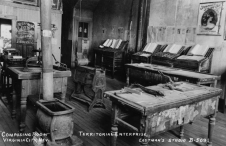Bob Brown
Few journalists and political figures have been more involved in Nevada politics than Bob Brown. Born in Glendale, California, he was the son of a newspaperman and started working in a pressroom when he was nine. He worked his way through college as a press operator for newspapers in New Mexico and Wyoming before spending five years with United Press, mainly covering the Far East and Middle East.
Brown went to work for publisher Donald W. Reynolds, editing newspapers for his Donrey Media Group in Arkansas and Alaska before moving to Las Vegas in 1961 to edit the Las Vegas Review-Journal. His father, Edwin, ran Reynolds's Carson City newspaper, the Nevada Appeal. In three years, the younger Brown revitalized the Las Vegas daily and its staff, which had been losing ground to Hank Greenspun's Las Vegas Sun. Brown resigned in 1964 due to a dispute with Reynolds over coverage of the U.S. Senate race between incumbent Democrat Howard Cannon and Republican Lieutenant Governor Paul Laxalt. Brown supported Laxalt while Reynolds backed Cannon, who ultimately won one of the closest elections in Nevada history.
For much of the next decade, Brown bounced between journalism (owning or editing newspapers in Arizona and Washington) and advertising as the co-owner of Las Vegas's May Advertising, where he helped train such future political powers as Sig Rogich and Jim Joyce. In 1973, he bought the Valley Times. Then a North Las Vegas tri-weekly, he made it a daily, competing with the larger Review-Journal and Sun, and revolutionizing Las Vegas journalism with authoritative coverage of organized crime and gaming. But Brown, to his chagrin, became news. Just after his election, Governor Robert List accused Brown of trying to blackmail him by offering to withhold a damaging news story in exchange for List supporting Stardust Resort and Casino executive Frank Rosenthal's quest for a gaming license. Rosenthal never received his license, and state officials never proved List's claims. But Brown helped Rosenthal skim more than $200,000 by kicking back advertising buys. In 1983, Brown pleaded guilty and later testified against others involved in the scam.
By then, his newspaper was in bankruptcy, and the IRS had seized his presses. Brown kept the paper going with a skeleton staff but died of a heart attack on June 8, 1984. The Times died two weeks later. Brown received posthumous recognition as a Distinguished Nevadan from the University of Nevada, an honor he originally declined because he wanted the university system to avoid any guilt by association. His legacy includes the changes he brought to the Las Vegas media and a long list of journalism, advertising, and political figures he influenced, including his son Mark Brown, a leading Las Vegas political consultant and advertising agency executive and owner.
Article Locations
Related Articles
Further Reading
None at this time.

